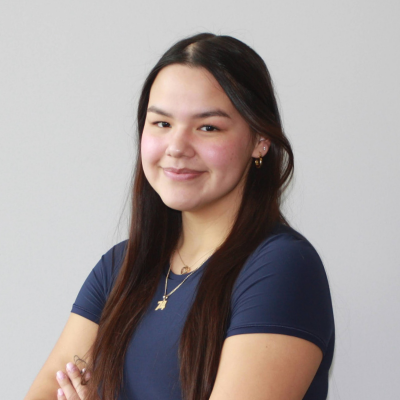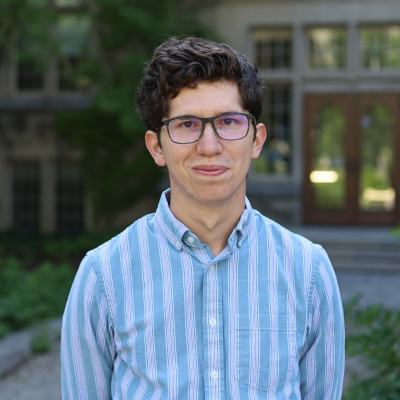Search Website
Carrying Stories Forward: USRI Student Niibin Pitawanakwat’s Research Journey
October 8, 2025
By Diana Corredor
When undergraduate student Niibin Pitawanakwat began her USRI (Undergraduate Summer Research Internship) placement under the supervision of Dr. Cody Groat, Assistant Professor of History and Indigenous Studies, she could not have anticipated the weight her work would carry—or the impact it would make far beyond the university.

Over sixteen weeks, Niibin undertook emotionally challenging research on Indigenous patients at the former Hospital in Woodstock. Much of her time was spent combing through case files and death certificates that often described patients in demeaning and dismissive terms. For Niibin, the work was both spiritually and emotionally taxing. “I often felt the burden of carrying stories of patients, sometimes youth, taken from their communities, scared, and who never returned home,” she reflected. “At many times, it was difficult to pick up the work again, but I am grateful to have had the opportunity to engage in research that matters so profoundly to Indigenous families and communities.”
Her dedication and careful approach did not go unnoticed. This summer, Niibin’s work was presented to the Anishinabek Nation, who have since announced plans to properly format her research and share it as an official report authored in her name. It will be distributed to Chiefs and Councils across the Anishinabek Nation, as well as to provincial and federal partners. They were deeply moved by her insights and perspective as a young Anishinaabekwe, and by her ability to carry forward histories that institutions often ignored or silenced.

For Dr. Groat, Niibin’s work stands as a remarkable accomplishment. “I am proud of the work that she produced, which was presented to Anishinabek Nation for their official use,” he shared. I think that this is a great example of an Indigenous scholar centering their identity but also substantiating their work.”
The USRI program at Western University aims to provide students with hands-on research experience, and Niibin’s journey reflects both the challenges and opportunities such work presents. Professional development sessions offered through the program—focused on research compliance, integrity, transparency, and accountability—helped her navigate the ethical complexities of the project. She became more mindful of how records were handled and how analysis should be presented with honesty and respect, ensuring her work would strengthen community trust.
Despite the challenges of incomplete archives and missing files, Niibin persisted. One of her accomplishments was identifying additional Indigenous patients who had been institutionalized, even if their files were fragmentary. This contribution, though seemingly small, has the potential to support future repatriation efforts and provide closure for families seeking answers.
“Recognizing that this was not simply an academic exercise but a personal and community-driven act of responsibility was one of my greatest strengths,” she reflected. Approaching the work with humility and seeking guidance from mentors and Elders when the emotional toll became heavy, Niibin embraced both the responsibility and the privilege of the work.
Her final reflection captures the heart of her experience: a deeper understanding of both the challenges and the responsibilities of research, and the conviction that this difficult work must continue.
Through her persistence, humility, and strength, Niibin Pitawanakwat’s research not only honours the memories of those who were institutionalized but also paves the way for healing, truth, and accountability. Her journey, guided by Dr. Groat and supported by the USRI program, stands as a testament to the power of undergraduate research when it is rooted in identity, responsibility, and community.